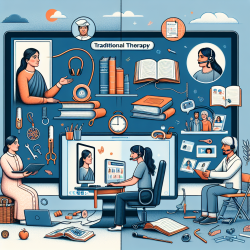Introduction
The COVID-19 pandemic has left a lasting impact on emerging adults (EAs), particularly those in college. As practitioners, understanding how to support EAs in building resilience is crucial. The research paper "Building Resilience: Helping Emerging Adults Cope During the Novel Coronavirus Pandemic" provides a comprehensive framework for addressing the biopsychosocial needs of EAs during and after the pandemic.
The Impact of COVID-19 on Emerging Adults
Emerging adults faced unprecedented challenges during the pandemic. The sudden shift to online learning, social distancing, and campus closures disrupted their developmental milestones and social connections. According to the research, these disruptions led to increased anxiety, depression, and other mental health concerns among EAs.
Resilience Theory: A Pathway to Recovery
Resilience theory offers a strengths-based approach to help EAs navigate adversity. By focusing on protective factors such as emotional regulation, social support, and meaning-making, practitioners can guide EAs toward positive adjustment and growth.
- Emotional Regulation: Encourage EAs to express their emotions and develop coping strategies to manage stress and anxiety.
- Social Support: Facilitate connections with peers and mentors to provide a sense of belonging and community.
- Meaning-Making: Help EAs find purpose and understanding in their experiences to foster resilience and adaptability.
Shared Trauma and the Therapeutic Relationship
The concept of shared trauma highlights the unique challenges faced by both clinicians and clients during the pandemic. Understanding the impact of shared trauma on the therapeutic relationship is essential for effective treatment. Clinicians can enhance therapeutic outcomes by acknowledging their own experiences and fostering a more relational model of care.
Practical Applications for Practitioners
Practitioners can implement the findings from the research paper to improve their therapeutic practices:
- Integrate resilience-building strategies into therapy sessions to support EAs in overcoming adversity.
- Encourage open communication and self-disclosure to strengthen the therapeutic alliance.
- Advocate for mental health resources and support systems within educational institutions to address the ongoing needs of EAs.
Conclusion
As we navigate the post-pandemic world, supporting emerging adults in building resilience is more important than ever. By applying the insights from resilience theory and understanding the impact of shared trauma, practitioners can create meaningful and lasting change for their clients.
To read the original research paper, please follow this link: Building Resilience: Helping Emerging Adults Cope During the Novel Coronavirus Pandemic










